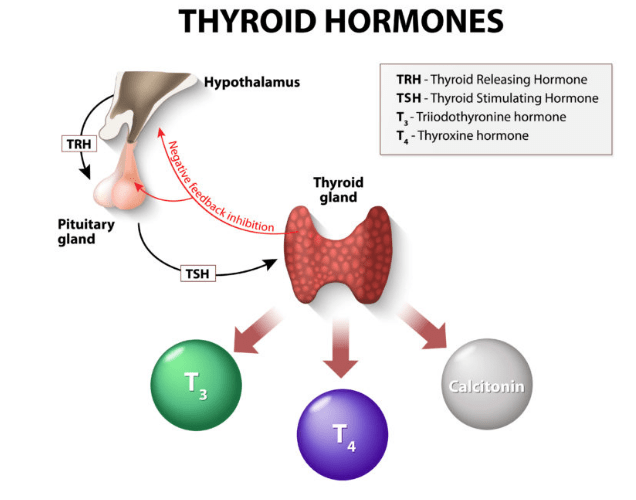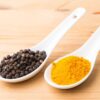The Truth About Curcumin’s Effect On Hypothyroidism
- Posted on
 Taiba Tariq
Taiba Tariq- Categories: Turmeric Nutrition

Hypothyroidism is a health condition in which the thyroid gland doesn’t make enough thyroid hormone, which can slow down metabolism and affect how your cells, tissue, and organs work. The leading cause of hypothyroidism is an autoimmune condition called Hashimoto’s thyroiditis. Symptoms include fatigue, feeling cold all the time, constipation, weight gain, and more. Curcumin is a compound found in spice turmeric that has antioxidant and anti-inflammatory properties. Some studies have shown that curcumin may help lower TSH levels (a marker for hypothyroidism), but results have been relatively inconclusive so far. Taking curcumin over the long term may help lower TSH levels as well as cholesterol levels, but more research needs to be done before any conclusions can be made about its effectiveness in treating hypothyroidism.
Curcumin for Hypothyroidism
The thyroid hormone is in the thyroid gland, located at the front of your neck. Hypothyroidism occurs when your thyroid gland doesn’t make enough thyroid hormone, which can slow down metabolism and affect how your cells, tissue, and organs work. The most common reason for hypothyroidism is an autoimmune condition called Hashimoto’s thyroiditis, which causes inflammation within the thyroid gland. The more you know about this vital organ, the better equipped you’ll be to treat hypothyroidism with diet or other methods.
How do your Thyroid Hormones work?

The thyroid gland produces two types of hormones (production of thyroxine (T4) and tri-iodothyronine (T3)). Receptors on cells regulate the T4 and T3 throughout your body. The pituitary gland releases TSH that stimulates the production of T4; T4 then binds to receptors on cell surfaces, where it’s converted into either T3 or reverse T3 (rT3).
The principal cause behind it
This disease causes inflammation and damage to your thyroid gland, which leads to an underactive thyroid. Hashimoto’s thyroiditis is the most ordinary cause of hypothyroidism in the USA, affecting women more than men.
The following symptoms suggest hypothyroidism:
- Fatigue
- Feeling cold all the time
- Constipation
- Weight gain (or the inability to lose weight)
- Hair loss or thinning hair
- Depression or other mood changes
In addition, patients may experience memory problems, bone loss, and more.
Curcumin in Turmeric Lower TSH levels
This bioactive compound, “curcumin,” is present in spice turmeric and has antioxidant and anti-inflammatory properties. It may help lower TSH levels.
In one study, healthy volunteers who took 3 grams of curcumin per day had a 20 percent reduction in TSH levels over 12 weeks.
Curcumin for Hypothyroidism: The Truth
Another study found that people with subclinical hypothyroidism experienced significant improvements in their thyroid function after taking 2 g/day for 4 months compared to placebo treatment. As you know, the thyroid gland in your neck produces hormones that help control your metabolism. One of these hormones is called TSH (thyroid-stimulating hormone). TSH stimulates the thyroid gland to make more thyroid hormones. If you have hypothyroidism, this process slows down and can cause symptoms such as fatigue and weight gain. However, before recommending turmeric or its main ingredient, curcumin, as a natural remedy for hypothyroidism, you must consider that research on curcumin in treating hypothyroidism is in the initial stage. Taking curcumin over the long term may help lower TSH levels.
What to do?
Research on curcumin as a treatment for hypothyroidism is still new, so speak with your doctor before starting any supplement. You must talk with your doctor first if you’re thinking of taking curcumin for hypothyroidism. The Food and Drug Administration (FDA) doesn’t fix the dosage of curcumin supplements for hypothyroidism, so their content may vary. Talk to your doctor about what dose is right for you and how long you should take it.
Seek advice from your healthcare provider about whether taking an over-the-counter thyroid hormone replacement pill would be better than taking a supplement like curcumin or black pepper extract. Whether FDA has approved these medications or not. For example, they can cause an irregular heartbeat or high blood pressure if taken in too high doses.
Conclusion
As a powerful antioxidant, curcumin may help lower TSH levels. However, more research must confirm its effectiveness in treating hypothyroidism. As with any supplement, your doctor can help determine if this supplement is safe and appropriate.
REFERENCES
Samanta L, Panigrahi J, Bhanja S, Chainy GB. Effect of turmeric and its active principle curcumin on t(3)-induced oxidative stress and hyperplasia in rat kidney: a comparison. https://www.ncbi.nlm.nih.gov/pmc/articles/PMC2994577/ Indian J Clin Biochem. 2010 Oct;25(4):393-7. doi: 10.1007/s12291-010-0046-6. Epub 2010 Oct 8. PMID: 21966112; PMCID: PMC2994577.
Shakeri F, Bibak B, Safdari MR, Keshavarzi Z, Jamialahmadi T, Sathyapalan T, Sahebkar A. Cellular and Molecular Mechanisms of Curcumin in Thyroid Gland Disorders. https://pubmed.ncbi.nlm.nih.gov/35142266/ Curr Med Chem. 2022;29(16):2878-2890. doi: 10.2174/0929867329666220210145033. PMID: 35142266.
Curcumin mitigates lithium-induced thyroid dysfunction by modulating antioxidant status, apoptosis and inflammatory cytokines, https://doi.org/10.1016/j.jobaz.2016.10.001
https://doi.org/10.2174/0929867329666220210145033
https://doi.org/10.2174/0929867329666220210145033
https://doi.org/10.2174/0929867329666220210145033
Taiba Tariq
Taiba Tariq is a healthcare nutrition hobbyist, enthusiastic about researching healthcare & skincare news while analyzing the latest and science-backed evidence about nutrition, skin care, and supplements. She wants to help people regain their beauty, health, and well-being through natural means.
all author posts




